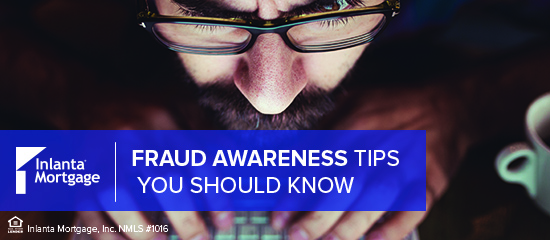Fraud Awareness and Prevention
Fraud Awareness and Prevention
Fraud, or the broad term describing wrongful or criminal deception intended to result in financial or personal gain is, unfortunately, something that happens everywhere, every day, negatively affecting the lives of many.
Fortunately, there are ways one can prevent falling victim to fraudulent acts, starting with educating oneself on the types of dangerous fraud schemes out there as well as what to watch out for.
Mortgage Fraud:
Mortgage fraud happens which is why it is crucial to work with a lender you can trust. According to stopfraud.gov, traditional mortgage fraud involves homebuyers and/or lenders falsifying information in order to obtain a home loan. Struggling homeowners are also often affected by “foreclosure rescue firms” claiming they can help these struggling individuals obtain home loans ultimately leaving them in more debt and distress. The first thing to watch out for in these situations is requests for all cash payments and to work only with credible lenders, real estate agents, and appraisers.
Other Types of Fraud:
According to FindLaw, there are many types of fraud offenses individuals can be duped by (often unknowingly) that include:
- bankruptcy fraud
- tax fraud (a.k.a. tax evasion)
- identity theft
- insurance fraud
- mail fraud
- credit/debit card fraud
- securities fraud
- telemarketing fraud
- wire fraud
Click here to learn more and educate yourself on popular scams occurring today.
Preventing Fraud – What to Watch out for:
Some warning signs of fraud are more obvious, such as the telemarketing or internet schemes that ask you to “send money immediately” to receive an offer, or, those asking directly for your social security number.
Others can be more tricky and deceptive, even imitating people you know personally or professionally asking for help or money via email, false charity organizations asking for donations, or, pyramid schemes that offer big rewards for a “work from home” position.
Here are some things you can do to protect yourself and your family from falling victim to fraud:
- New forms of fraud pop up every day. Educate yourself on the common scams happening presently
- Keep your personal information confidential. Never give out personal information, such as your social security number or credit card details, over the phone, through email, or over the internet unless the contact is verified.
- Update your passwords and PIN numbers monthly to ensure your information is secure. Make sure to use a password that is strong in security and includes letter, numbers, and symbols.
- Check your statements and online banking records regularly to ensure there are no unusual transactions.
If you think you or someone you know has been affected by fraud, begin by reporting the issue immediately to your local police department. Otherwise, take these steps from USA.gov:
- Contact the Federal Trade Commission (FTC) or use the Online Complaint Assistant to report most types frauds.
- Report fraud that used the U.S. Mail to the U.S. Postal Inspection Service.
- Report identity theft or data breaches through IdentityTheft.gov.
- File complaints about internet-based frauds to the Internet Crime Complaint Center.
- Contact the Centers for Medicare & Medicaid Services to report instances of Medicare fraud.
- Report Medicaid fraud to your state’s Medicaid program office. Use the Fraud and Abuse Reporting Directory (PDF, Download Adobe Reader) to find the contact information for your office.
- File a complaint about e-commerce (business or trade that takes place on the internet) across international borders to econsumer.gov. Report other fraudulent business practices to the Department of Commerce’s International Trade Administration.
- Report immigration fraud, the illegal use of documents or illegal actions to get around U.S. immigration laws, to the U.S. Immigration and Customs Enforcement.
- Report suspected census related frauds, where scammers act like they are collecting your personal information for the government, to the Census Bureau.
- If you are the victim of moving fraud, you have two options. If you are moving within the same state, file a complaint with your state utility commission. If your move is interstate, you can file your complaint with the Federal Motor Carrier Safety Administration.
- Report investing frauds to the Securities and Exchange Commission or your state’s securities regulator.
- Contact the Consumer Financial Protection Bureau about credit and loan related frauds. The agency can also help you with frauds related to money transfers, credit reports, and other financial services.
- File a complaint with the Federal Communications Commission for telephone related frauds, such as mysterious charges on your bill (cramming), an illegal switch of your service (slamming), or telemarketing.
- Visit Stopfraud.gov for information on which agencies you should report banking, credit card, housing, and other financial frauds too.
- Report Social Security-related frauds with the Social Security Administration’s Inspector General or using their online fraud reporting form.
- Report misuse of federal funds to Government Accountability Office through the FraudNet form.
- Report imposter frauds, where someone pretends to be from the government, company, employer, or someone you know, to the Federal Trade Commission.
